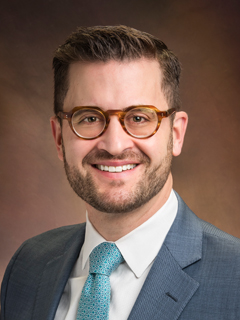HOW CAN WE HELP YOU? Call 1-800-TRY-CHOP
In This Section

Dr. Tasian and his research team use an epidemiologic framework, including randomized trials and multi-institutional observational studies, to examine the etiology of kidney stone disease and the comparative effectiveness of surgical interventions. He also employs machine learning of complex data to improve diagnosis, risk stratification, and prediction of treatment response for children and adults with benign urologic disease.
Bio
The long-term goal of Dr. Tasian's clinical and research programs is to improve the lives of children with nephrolithiasis and congenital urologic disease. His research group uses a combination of large data analytics, behavioral economics, nutritional profiling, and human biospecimen analysis to discover determinants of kidney stone disease with the goal of translating this knowledge into new treatments for kidney stone prevention.
Active projects include examination of metabolic pathways in the gut-kidney axis that could be targets for novel therapeutics to prevent kidney stones. Specifically, Dr. Tasian is investigating the impact of diet and antibiotic exposure on the gut microbiome and metabolites in the intestinal and urinary tract and their contribution to calcium kidney stones in children and adults. He is also performing prospective cohort studies to compare stone clearance and patients’ experiences after alternative surgical interventions for kidney stones. He also applies machine learning to improve understanding of the pathophysiology, diagnosis, risk stratification, and prediction of treatment responses of benign urological disease among children.
Dr. Tasian and his team have made the following discoveries:
- Characterized the rapid increase in kidney stone disease among children, adolescents, and young adult women.
- Defined the precise relationship between daily temperatures and kidney stone presentation, which has important implications for the impact of climate change on human health.
- Recently published the first evidence that oral antibiotics are associated with an increased risk of kidney stones. The risk was greatest for those exposed at younger ages, which could help explain the rapid increase in the incidence of nephrolithiasis among children.
- Found that lower renal parenchymal area was associated with an increased risk of end-stage renal disease in boys with posterior urethral valves. Collaborations with Yong Fan at the University of Pennsylvania determined that machine learning of ultrasound images accurately identified children with congenital urologic disease.
Education and Training
BA, Trinity University (Biology and English), 2000
MSc, University of Oxford (Neuroscience), 2004
MD, Baylor College of Medicine, 2005
Fellowship, Children's Hospital of Philadelphia, 2013
MSCE, University of Pennsylvania (Clinical Epidemiology), 2014
Titles and Academic Titles
Attending Urologist
Associate Professor of Surgery and Epidemiology (with tenure)
Director, Pediatric KIDney Stone (PKIDS) Care Improvement Network
Core Faculty, CHOP PolicyLab
Core Faculty, Clinical Futures
Professional Memberships
American Urological Association, 2007-
Society of Pediatric Urology, 2011-
Pediatric National Surgery Quality Improvement Program, 2014-
American College of Surgeons, 2014-
American Medical Association, 2014-
Society of University Urologists, 2014-
Professional Awards
Outstanding Patient Oriented Research Presentation; 22nd annual CHOP Research Poster Day, 2012, 2014
CPCE Pilot Grant Award, 2013
Best Poster Award; International Pediatric Nephrology Association, 2013
American Society for Clinical Investigation Young Physician-Scientist Award, 2016
Election to Research on Calculous Kinetics (ROCK) Society, 2017
Third place, American Urological Association Young Investigator Award, 2017
Publication Highlights
Active Grants/Contracts
Active
Harnessing Behavior to Decrease Urinary Stone Disease Morbidity
- National Institute of Diabetes and Digestive and Kidney Diseases
- 2016-2021
- Goal: To apply behavioral theories to increase adherence to water intake to decrease stone recurrence among adolescents and adults. The project will also examine mechanisms of ureteral stent symptoms after ureteroscopy and establish a biorepository to support future research on urinary stone disease.
- Co-PI: Gregory Tasian, MD
Anatomic Biomarkers of Chronic Kidney Disease Progression Among Children
- National Institute of Diabetes and Digestive and Kidney Diseases
- 2019-2021
- Goal: To identify and validate biomarkers of chronic kidney disease progression among children with congenital abnormalities of the kidney and urinary tract using machine learning and ultrasound.
- Co-PI: Gregory Tasian, MD
Evaluation of the Gut-Kidney Axis in Kidney Stone Disease
- National Institute of Diabetes and Digestive and Kidney Diseases
- 2019-2023
- Goal: To determine how diet and antibiotics contribute to nephrolithiasis by perturbing the gut-kidney axis through alterations of the gut microbiome.
- PI: Gregory Tasian, MD
Comparative Effectiveness of Pediatric Kidney Stone Surgery
- Patient-Centered Outcomes Research Institute
- 2020-2022
- Goal: To compare stone clearance and lived experiences for ureteroscopy, shockwave lithotripsy, and percutaneous nephrolithotomy for pediatric patients with kidney stones.
- PI: Gregory Tasian, MD
Center for Machine Learning in Urology
- National Institute of Diabetes and Digestive and Kidney Diseases
- 2021-2021
- Goal: To apply cutting-edge approaches in machine learning to analyze complex imaging data for individuals with kidney stone disease. The Center’s strategic vision of using machine learning to generate knowledge that improves diagnosis, risk stratification strategies, and prediction of outcomes among children and adults will be augmented through the implementation of the Educational Enrichment Program.
- PI: Gregory Tasian, MD
PENDING
Machine Learning to Predict Outcomes for Children with Urologic Disease
- Pennsylvania Department of Health
- 2020-2024
- Goal: To apply machine learning to videourodynamics data to classify, at the point of care, children with spina bifida at greatest risk for chronic kidney disease and thus identify children most likely to benefit from early treatment and spare those who are unlikely to benefit from treatment-related harms.
- PI: Gregory Tasian, MD
OVERLAP
Overlap: There is no scientific overlap with the active and pending grants.
Links of Interest
Antibiotics May Raise the Risk for Kidney Stone (New York Times, May 10, 2018)
CHOP study links antibiotic use with risk of kidney stones (Philadelphia Inquirer, May 10, 2018).
CHOP researchers: Why are so many kids getting kidney stones? (WHYY, May 8, 2018)
Climate change may increase kidney stone risk (news@JAMA, July 10, 2014)
Climate change may bring more kidney stones (Science Daily, July 10, 2014)
Pediatric KIDney Stone (PKIDS) Care Improvement Network (PKIDS)